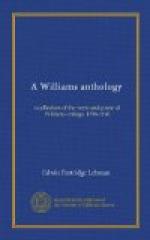But educational realities go deeper than outward prosperity. A college reflects her president’s personality in things of mind and of spirit. To business capacity Dr. Carter added distinguished scholarship and the genius of a teacher born. All this was made living effective by single-hearted loyalty to the best interests of the college as he saw them and by devotion to the highest moral and intellectual good of the students. He did not swerve from duty as he understood it to follow an easy popularity. The burdens that he bore and the labors that he accomplished, at personal cost in more ways than one, rested in the last analysis on this substratum of self-denying service.
His work has extended far beyond the college. His grace of expression in both speech and print, the keenness of his wit, his administrative power, and his command of educational resources have been recognized and made available beyond the limits of his presidency and apart from the demands of Williams alone. Honored in many spheres, he has thus brought added honor to the college. The solidarity of his achievements for Williams is revealed more clearly as time proceeds. More and more the alumni are coming to appreciate this as both historical fact and academic heritage. This shall be his reward as he continues, and may it be for long, to live close to the college and to the town that he has served and loved.
V. HAMILTON WRIGHT MABIE
WILLIAM M. GROSVENOR ’85
It would be easy enough for me to study critically Mr. Mabie’s books, for he has written many and they are well known and widely read; I might give you a criticism of him as thinker and author. If criticism is, (as I believe Matthew Arnold once defined it) the discerning of the characteristic excellencies in things, I could easily show you the charm of Mr. Mabie’s English, the wide range of his culture, the sweetness and light of his interpretations of nature and human life. But this is rather a brief tribute to the man himself whom we sons of Williams have known and admired these many years, and this or any like tribute, however inadequate, will serve to pay a little of the debt we owe him for all that he is and all that he has done.
Born in 1846, he graduated from college in 1867 and from the Columbia Law School in 1869. As I graduated eighteen years later, I never knew him in those earlier days. But the law did not claim him; almost at once he turned to literature, for that clearly was his God-given aptitude. For nearly thirty years he has been an editor of the Christian Union, which afterward became the Outlook.




